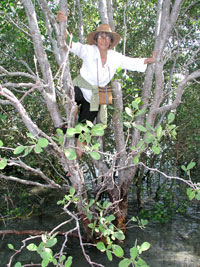Ilonggo scientist featured by Time magazine

Jurgenne Primavera
An Iloilo-based retired scientist and environmentalist has been featured by Time magazine for her work in helping protect the environment.
Jurgenne Primavera, senior scientist at the Southeast Asian Fisheries and Development Center (SEAFDEC) until she retired two years ago, is among the Time's "Heroes of the Environment" in its October 6 special issue
She was among the 30 individuals and teams, including activists, scientists, celebrities, innovators and financiers all over the world who were honored for their contribution to the protection of the environment. Among those featured is former action star and California Gov. Arnold Schwarzenegger.
Time said said in its special report that what the personalities have in common is the passion and resourcefulness to confront environmental threats.
"They cannot solve climate change alone or save endangered species single-handedly. But by their example, by their willingness to dedicate themselves to what too many still dismiss as a hopeless case, these heroes of the environment provide light in the darkness," the report said.
Primavera, 61, was lauded for her "groundbreaking studies" on the life cycles of tiger prawns in the country which "helped galvanize an aquaculture revolution."
The magazine cited her campaign for sustainable fish-farming in order to protect the mangrove forests that act as a fish nursery and a crucial buffer zone between land and sea which help block floods and tsunamis.
Primavera, who has already received various awards, honors and citations from the academe and scientific community, including an honorary doctorate degree from the Stockholm University in 2004, said she is happy that she was featured by Time because this would bring her campaign to a wider audience.
"It's not for me. It's for the mangroves," she said in a telephone interview.
Primavera has spoken out on threats of the booming shrimp and prawn industry on mangroves pointing out the destruction of mangrove areas or its conversion to fishponds.
She also raised concern on the negative impact of fishponds to municipal fishing which are the means of livelihood of majority of fishermen.
At a time when aquaculture was booming, Primavera rung warning bells on the perils of unregulated shrimp farming.
She has pushed for the maintenance of a health balance between areas developed for aquaculture and those preserved for mangroves. For every unit area developed for ponds, there should be at least four unit areas for mangroves (1:4) to help protect the environment.
But she said the international fame would mean more to here if more people would embrace her advocacy.
"It's not me and my peers who will ultimately save the environment. It's the laymen, the common folk, who will," she said.
She also hopes the fame will prompt young people to take up marine biology and focus on mangroves.
